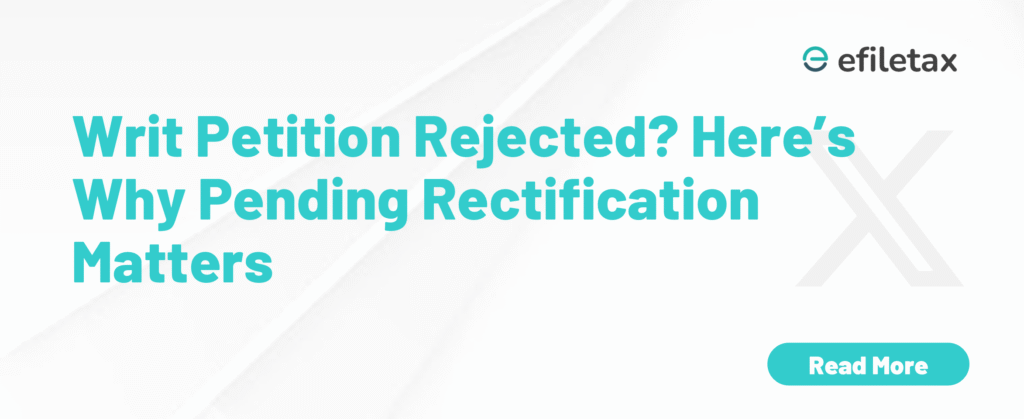
Writ Petition Not Maintainable Legal Clarity on Pending Rectification
When a taxpayer disagrees with a tax assessment or order, one of the available remedies is to file a writ petition under Article 226 of the Constitution. But what if a rectification application is already pending before the same authority? Can a writ still be entertained?
Short answer: No. Courts have consistently held that a writ petition is not maintainable if a statutory remedy like rectification under Section 154 of the Income Tax Act, 1961 is pending and has not been exhausted.
Why This Matters to Taxpayers and Professionals
Filing writ petitions prematurely often leads to unnecessary litigation, delay in relief, and outright dismissal. Understanding this principle ensures that taxpayers:
- Avoid legal costs and delays
- Follow proper procedural hierarchy
- Strengthen their chances of getting relief through correct channels
Key Legal Basis
🔹 Section 154 – Rectification of Mistakes
- Allows an income tax authority to amend any order to correct a mistake apparent from the record
- Can be filed within 4 years from the end of the financial year
- Remedy available before escalating to higher forums
Judicial Precedents
| Case Name | Court | Verdict Summary |
|---|---|---|
| Sundaram Finance Ltd. v. ACIT (2023) | Madras HC | Writ petition was dismissed as rectification under Section 154 was already pending. Petitioner advised to await disposal. |
| K.M. Sugar Mills Ltd. v. ACIT (2021) | Allahabad HC | Held that availability of alternative remedy bars writ intervention unless there’s violation of natural justice. |
| CIT v. Rajkumar Shivhare (2022) | SC | Reiterated the principle that writ jurisdiction should not be invoked if effective statutory remedies are available. |
Practical Implications
Before moving to High Court under writ jurisdiction:
✅ Check if any of these are pending:
- Rectification application
- Appeal before CIT(A)
- Revision under Section 264
✅ If pending – wait for the outcome
✅ If delayed unreasonably – seek legal advice before approaching the Court
Expert Tip
“Always exhaust available remedies. Filing a writ prematurely not only leads to dismissal but also weakens your legal standing.”
— Tax Litigation Consultant, Efiletax
When Can Writ Still Be Considered?
Courts may entertain writs only under exceptional circumstances, such as:
- Violation of natural justice
- Lack of jurisdiction by the authority
- Inordinate delay without valid reason
But even in such cases, the burden of proof lies heavily on the petitioner.
What Taxpayers Should Do
- File rectification under Section 154 (if applicable)
- Track the application status and follow up regularly
- If no response beyond a reasonable time, consider legal action
- Maintain all records of correspondence and filing acknowledgments
Final Takeaway
The law is clear: Writ petition is not maintainable when rectification is pending. Instead of rushing to court, use available statutory mechanisms wisely.
Need Help with Tax Disputes or Rectification Filing?
At Efiletax, our experts can:
- Draft and file rectification applications
- Liaise with tax officers for timely resolution
- Assist in appeals, revisions, or legal strategy
FAQ Section
Q1. What is a writ petition in tax matters?
A writ petition is a constitutional remedy filed in High Court against unlawful or unjust action by tax authorities.
Q2. Can I file a writ without filing a rectification first?
Generally, no. Courts prefer that you exhaust statutory remedies like rectification under Section 154 first.
Q3. What if the rectification application is delayed?
You may approach the High Court, but only after showing that your request has been unreasonably delayed and all other options have failed.
Summary
Courts have ruled that a writ petition is not maintainable when a rectification application is pending. Taxpayers must first exhaust remedies like Section 154 rectification before approaching the High Court. Knowing the legal hierarchy avoids dismissal and saves time in tax disputes.